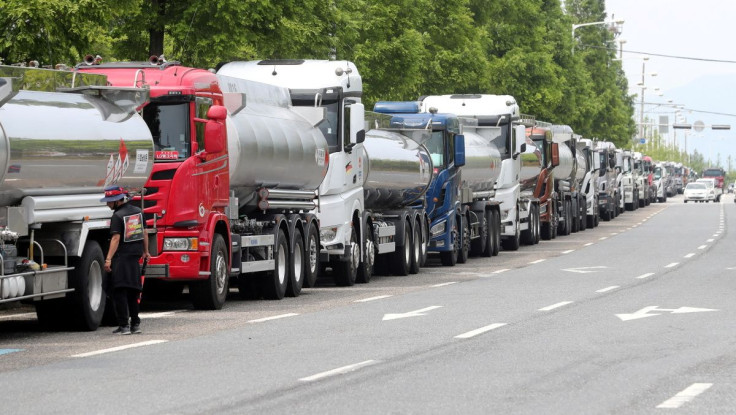Truckers’ Stir In Korea Applies Breaks On Global Supply Chain

The truckers' strike in South Korea has added salt to the wounds of the global supply chain networks as the fourth largest Asian economy is the global hub for cars, electronics and computer chips.
The truckers' stir, seeking a pay hike and a guarantee on minimum rates for freight which was introduced during the pandemic and is due to expire this year, has turned into a major test for new conservative President Yoon Suk-yeol.
The truckers, led by the Cargo Truckers Solidarity Union, have held four rounds of talks with the government which have remained inconclusive so far. On 14 June, the truckers' union blamed the transport ministry for the current impasse in reaching a deal and decided to go ahead with their strike.
On its seventh day, 13 June, the strike has cost key industrial sectors in the Asian manufacturing powerhouse more than $1.2 billion, the government has admitted.
Distribution networks in major industrial complexes in Ulsan, Yeosu and Daesan are particularly targeted by the protesters to have maximum impact. So far, automakers have suffered 5,400 vehicles in lost production, said the Korea Automobile Manufacturers' Association, with leading player Hyundai Motor applying breaks on its assembly lines, including its biggest manufacturing plant in the southeastern city of Ulsan.
South Korean companies and their chaebols are major global suppliers of critical components and materials like semiconductors, steel, and a host of other top-shelf electronics names.
POSCO, the world's sixth-largest steelmaker by output, has shut plants due to the paucity of space to store the finished products. The daily production of wire rods and cold-rolled steel by the country's large steel maker fell by 7,500 tons and 4,500 tons, respectively. Most cement companies are also finding less space to store after their units reach full capacity.
Leading petrochemical firms, mainly at Yeosu and Daesan, are getting fewer daily shipments and semiconductor firms like Samsung Electronics and SK Hynix are walking that extra mile to keep production going at their assembly lines. Hankook Tire, the seventh-largest tire company in the world, said it had to cut daily shipments.
The strike by the 22,000-strong union is taking place as exports from the 10th largest economy in the world suffered a beating with a 12.7 percent fall in the first 10 days of this month compared with the previous year. Car exports decreased by 35 percent and electronic goods fell by 27 percent in the same period.
Already, South Korea's inflation is set to hit a 24-year high of 4.8 percent this year and its growth forecast has been reduced to 2.7 percent from 3.0 percent this year.
The Korea Enterprises Federation along with 30 industry groups has urged the truckers to call off the strike but the truckers have turned down the demand made on 12 June.
As traffic is moving at a snail's pace at its ports, the government has pressed into service 100 trucks from the military and other local government agencies. To put more pressure, the protesting truckers are planning a blockade of power plants during the peak summer season.
"We are thinking of a complete blockade," union leader Kim Jae-gwang told Reuters.
With no end in sight, President Yoon, a political novice who took office 10 May, has already earned the wrath of powerful unions in the country. As the government does not control the country's parliament, it has proven to be hard for President Yoon to piece together a new law to extend the minimum rates for freight which is one of the demands of truckers.
Given that steel, petrochemicals, and semiconductors are most important for the global economy, fears have grown over their disruptions, which can start to bite the entire world economy.
As the global economy is struggling to cope with supply bottlenecks, shortages of chips, petrochemicals and autos from South Korea, could add more oil to the frying pan with the negative impacts of rising inflation and slowing growth.





